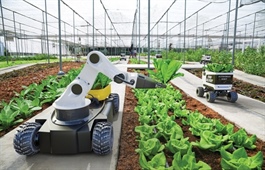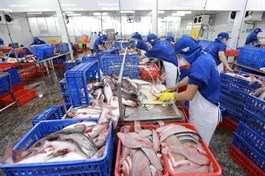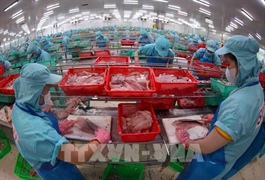Digitalisation and innovation power agri-revolution
Digitalisation and innovation power agri-revolution
Vietnam’s economic ascent is one of Asia’s most remarkable success stories.
From the devastation of war, the nation has emerged as a vibrant middle-income economy, with GDP growth averaging over 6 per cent annually for two decades. Poverty rates plummeted from nearly 60 per cent in the 1990s to under 5 per cent today – a transformation fuelled in large part by agricultural development.

Ambrosio N. Barros, Vietnam country director International Fund for Agricultural Development |
Once struggling with food shortages, Vietnam now ranks among the world’s top exporters of rice, robusta coffee, cashews, and aquaculture products, with agricultural exports turnover reaching $62.5 billion in 2024, an increase of 18.5 per cent compared to 2023.
This agricultural boom has been the bedrock of Vietnam’s economic miracle. The economic reforms of the 1980s unleashed the potential of smallholder farmers, while strategic public investments in irrigation and rural infrastructure created the conditions for growth. Today, agriculture contributes about 12 per cent of GDP and employs 38 per cent of the workforce, proving that farming can be both productive and profitable.
Yet Vietnam’s ambitions do not stop there. The government’s vision to become a high-income economy by 2045 requires another leap forward – one that addresses the urgent challenges of climate change, environmental sustainability, and inclusive growth. With rising temperatures threatening the Mekong Delta (which produces about half of Vietnam’s rice) and global markets demanding greener production methods, business as usual is no longer an option.
The Fourth Industrial Revolution offers Vietnam powerful tools to overcome these challenges. In the Mekong Delta, farmers using smartphone apps receive real-time weather alerts that help them avoid climate damage to crops. In the Central Highlands, blockchain technology traces coffee beans from farm to cup, ensuring fair prices for producers. These innovations demonstrate how digitalisation can make agriculture more resilient, efficient, and profitable.
However, the benefits of technology must reach all farmers. While Vietnam boasts 70 million smartphone users, a digital divide persists in rural areas. Female farmers – who constitute the majority of the agricultural workforce – often lack access to digital tools and training. Young people frequently view farming as backbreaking labour with little reward, despite the sector’s growing technological sophistication.
Closing these gaps requires concerted action. The government’s digital transformation programme aims to bring all communes online by the end of 2025, creating unprecedented opportunities for rural communities. Development partners like the International Fund for Agricultural Development (IFAD) can complement these efforts by supporting digital literacy programmes tailored to smallholder farmers, women, and youth entrepreneurship initiatives that make agriculture an attractive career choice.
The private sector has a crucial role to play. Vietnamese agritech has huge potential to grow. With the right policy incentives – from tax breaks for agritech adoption to streamlined regulations for e-commerce in rural areas – such innovations could scale nationwide.
Vietnam’s agricultural future lies in producing more with less. Precision farming techniques could reduce water use by 30 per cent while maintaining output. Organic and sustainable certification initiatives open doors to premium international markets. The EU’s Forest Law Enforcement, Governance and Trade licensing system for Vietnamese timber products demonstrates how sustainability standards can create competitive advantages.
The Mekong Delta, responsible for most of Vietnam’s rice exports, presents both the greatest challenge and opportunity. Rising sea levels and saltwater intrusion threaten this vital region, but our climate-smart projects in Ben Tre and Tra Vinh provinces have already helped thousands of farmers adapt while reducing greenhouse gas emissions.
Vietnam’s agricultural transformation has always been a collective achievement. The reforms of 40 years ago succeeded because they empowered farmers. Today’s new era of Vietnam require similar collaboration between the government, businesses, farmers, and development partners.
As Vietnam implements its ambitious green growth strategy, agriculture must be at the heart of the transition. The potential rewards are immense: a thriving rural economy, global leadership in sustainable food production, and continued progress towards high-income status.
The choice is clear. By embracing innovation and ensuring no farmer is left behind in the digital revolution, Vietnam can write the next chapter of its remarkable development story – one where technology, tradition, and sustainability grow together. With the unwavering support of partners like the IFAD, Vietnam’s farmers can transition into leaders of a climate-smart, digitally empowered agriculture. They have already demonstrated their ability to feed the nation and beyond; now, with the right tools, they can spearhead a global movement towards sustainable food production, setting a precedent for future generations.
Together, we can forge a resilient and prosperous agricultural landscape that both meets the needs of today and safeguards the future.
- 16:15 26/04/2025



























